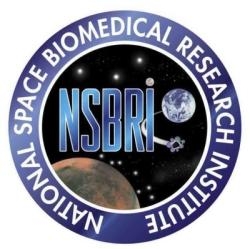Wed, Aug 21, 2013
Soliciting For A Center For Space Radiation Research
The National Space Biomedical Research Institute (NSBRI) is soliciting for program proposals to establish a Center for Space Radiation Research (CSRR). The CSRR will build upon important discoveries made by the NSBRI Center of Acute Radiation Research and extend them by characterizing and quantifying the effects of space radiation on living systems. Operating in close partnership with NASA's Human Research Program, the CSRR will be tasked with researching the acute effects of space radiation, as well as the longer term, so-called "degenerative" effects of space radiation on the cardiovascular and circulatory systems. Accordingly, the CSRR will work to reduce the radiation related health risks that will be encountered by astronaut crews during future missions to an asteroid, the Moon or Mars. This research announcement entitled "Center for Space Radiation Research" was released by NSBRI on August 14, 2013.

The CSRR will combine exposures to both solar and galactic particles, thereby more closely mimicking the environment actually experienced by astronauts during exploration missions. Pharmaceutical countermeasures will also be evaluated for their ability to mitigate the harmful effects of space radiation. Scientific discoveries made by the CSRR will not only enable safe and productive human exploration of space, but may also have the potential to improve life on Earth.
The CSRR will use a systems biology approach to characterize the effects of space radiation by combining physiological observations with new 21st century integrated -omics techniques, such as genomics, proteomics and metabolomics. This strategy will facilitate the correlation of observed health effects with the more fundamental underlying genetic and bimolecular changes that occur in response to radiation, thereby advancing knowledge and providing possible new options for the development and deployment of radiological countermeasures.
This NSBRI request for applications, (RFA) may be viewed online under the Funding Opportunities menu, within the Current Announcements section. The RFA is also available via the NASA Research Opportunities homepage by navigating through the menu listings "Solicitations" to "Open Solicitations." On the Open Solicitations page, researchers should select "NSBRIRFA1302" from the list of solicitations.
Applications should be submitted using NSPIRES, the deadline for application submittal of 5 P.M. Central Standard Time on December 12, 2013. Researchers intending to submit a full proposal must submit a notice of intent by 5 P.M. Central Time on September 13, 2013. Participation is open to all categories of U.S. based organizations, including educational institutions, industry, nonprofit organizations, NASA centers, and other Government agencies. Both notices of intent and program proposals must be submitted electronically via NSPIRES.
More News
Aero Linx: JAARS Nearly 1.5 billion people, using more than 5,500 languages, do not have a full Bible in their first language. Many of these people live in the most remote parts of>[...]
'Airplane Bounced Twice On The Grass Runway, Resulting In The Nose Wheel Separating From The Airplane...' Analysis: The pilot reported, “upon touchdown, the plane jumped back>[...]
"Burt is best known to the public for his historic designs of SpaceShipOne, Voyager, and GlobalFlyer, but for EAA members and aviation aficionados, his unique concepts began more t>[...]
"Polaris Dawn, the first of the program’s three human spaceflight missions, is targeted to launch to orbit no earlier than summer 2024. During the five-day mission, the crew >[...]
There Are SO Many Ways To Get YOUR Aero-News! It’s been a while since we have reminded everyone about all the ways we offer your daily dose of aviation news on-the-go...so he>[...]
 ANN's Daily Aero-Linx (05.04.24)
ANN's Daily Aero-Linx (05.04.24) NTSB Final Report: Quest Aircraft Co Inc Kodiak 100
NTSB Final Report: Quest Aircraft Co Inc Kodiak 100 Aero-News: Quote of the Day (05.04.24)
Aero-News: Quote of the Day (05.04.24) Aero-News: Quote of the Day (05.05.24)
Aero-News: Quote of the Day (05.05.24) Read/Watch/Listen... ANN Does It All
Read/Watch/Listen... ANN Does It All



